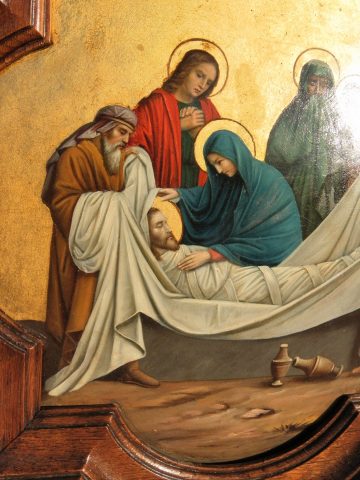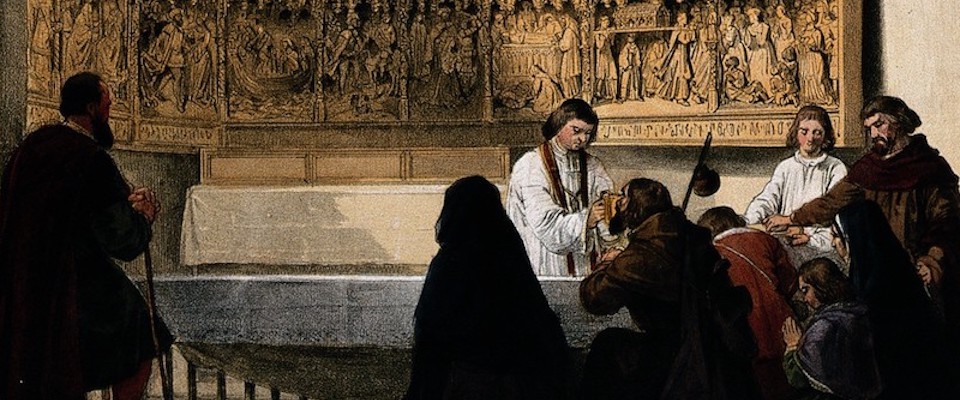Daily Scripture Reading and Meditation: They Laid Him in a Rock-Hewn Tomb

Easter Is the Door, and Good Friday Is the Key, by William L. Patenaude
April 8, 2023
FBI Still Targeting Conservatives, by Nicholas Wylie
April 8, 2023
Pethrus / CC BY-SA
Author Don Schwager, Servants of the Word
GOSPEL READING: Luke 23:50-56
50 Now there was a man named Joseph from the Jewish town of Arimathea. He was a member of the council, a good and righteous man, 51 who had not consented to their purpose and deed, and he was looking for the kingdom of God. 52 This man went to Pilate and asked for the body of Jesus. 53 Then he took it down and wrapped it in a linen shroud, and laid him in a rock-hewn tomb, where no one had ever yet been laid. 54 It was the day of Preparation, and the sabbath was beginning. 55 The women who had come with him from Galilee followed, and saw the tomb, and how his body was laid; 56 then they returned, and prepared spices and ointments. On the sabbath they rested according to the commandment.
Meditation: Jesus not only died for our sins (1 Corinthians 15:3); he also, by the grace of God, tasted death for every one (Hebrews 2:9). It was a real death that put an end to his earthly human existence. Jesus died in mid afternoon and the Sabbath began at 6:00 pm. Since the Jewish law permitted no work on the Sabbath, the body had to be buried quickly. Someone brave enough would have to get permission from the Roman authorities to take the body and bury it. The bodies of executed criminals were usually left unburied as carrion (dead flesh) for the vultures and dogs. Jesus was spared this indignity through the gracious intervention of Joseph of Arimethea.
Isaiah foretold that the Messiah would be buried in a rich man’s tomb – but no tomb could contain him for long
Who was this admirer and secret disciple of Jesus? Luke tells us that Joseph was a member of the Sanhedrin, the supreme Jewish council that condemned Jesus. We are told that he did not agree with their verdict. He was either absent from their meeting or silent when they tried Jesus. What kind of man was Joseph? Luke tells us that he was “good and righteous” and “looking for the kingdom of God”. Although he did not stand up for Jesus at his trial, he nonetheless, sought to honor him in his death by giving him a proper burial. This was to fulfill what the prophet Isaiah had foretold: “He was cut off out of the land of the living ..and they made his grave with the wicked and with a rich man in his death, although he had done no violence, and there was no deceit in his mouth” (Isaiah 53:8-9).
The power of God kept Jesus’ body from corruption so he could rise victorious on the third day
In the Book of Revelation, the Lord Jesus speaks: “Fear not, I am the first and the last, and the living one: I died, and behold I am alive for evermore, and I have the keys of Death and Hades” (Revelation 1:17-18). No tomb in the world could contain the Lord Jesus for long. His death on the cross purchased our redemption and his triumph over the grave on Easter morning defeated death. What preserved the Lord Jesus from corruption? He was kept from decay and he rose from the dead by divine power. “My flesh will dwell in hope. For you will not let your Holy One see corruption” (Psalm 16:9-10). The mystery of Christ’s lying in the tomb on the sabbath reveals the great sabbath rest of God after the fulfillment of our salvation which brings peace to the whole world (Colossians 1:18-20). Is your hope in this life only, or is it well founded in the resurrection of Christ and his promise that those who believe in him will live forever?
Lord Jesus, you died that I might live forever in your kingdom of peace and righteousness. Strengthen my faith that I may I know the power of your resurrection and live in the hope of seeing you face to face for ever.
Psalm 16:1; 8-11
1 Preserve me, O God, for in you I take refuge.
8 I keep the LORD always before me; because he is at my right hand, I shall not be moved.
9 Therefore my heart is glad, and my soul rejoices; my body also dwells secure.
10 For you do not give me up to Sheol, or let your godly one see the Pit.
11 You show me the path of life; in your presence there is fulness of joy, in your right hand are pleasures for evermore.




